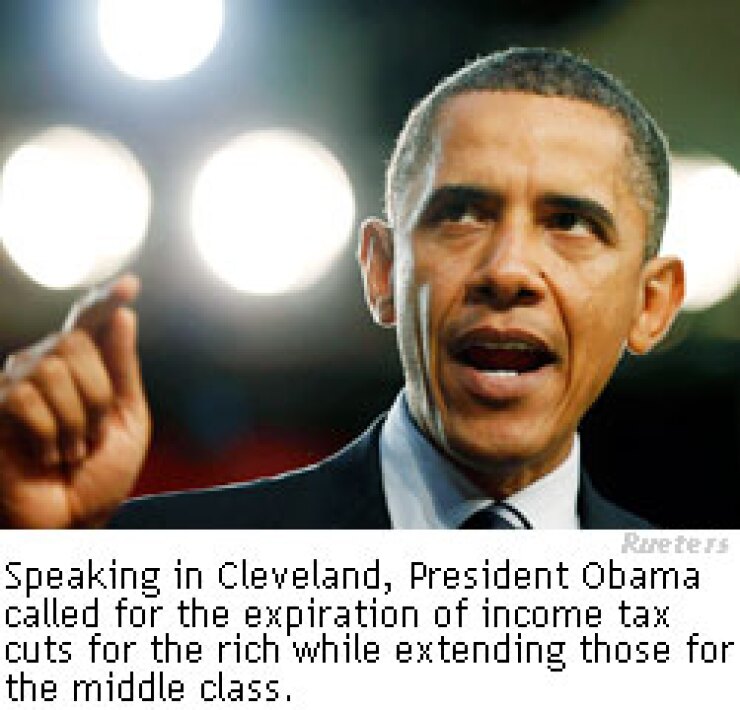
WASHINGTON — Federal lawmakers return to work next week, but market participants warn it is unlikely they will take action on proposals to extend expiring tax programs like Build America Bonds or extend income tax cuts for the middle class before the November elections.
Senate lawmakers return to work on Monday, and House members return the next day.
On Wednesday, President Obama called for Congress to allow cuts in the income tax rates for the top two tax brackets to expire at the end of the year so that they revert to 35% from 33% and to 39% from 35%. Obama also urged the lawmakers to extend cuts in income tax rates for the middle class.
Republicans have called for all of the income tax rate cuts to be extended by two years.
Increasing the tax burden for the highest income earners could spawn greater demand for tax-exempt debt, sources said.
“The municipal market is obviously much more attractive as tax rates go up,” said Richard Ciccarone, a managing director and the chief research officer at McDonnell Investment Management LLC.
Also, pending in the House is a tax package that would extend several expiring or expired tax provisions, including the BAB program. BABs will expire at the end of the year without an extension. Several attempts by lawmakers to extend the program and other temporary bond provisions have fallen short, mainly due to gridlock in the Senate.
The most recent extenders bill was introduced in late July by House Ways and Means Committee chairman Sander Levin, D-Mich.
William Daly, senior vice president of government relations for the Bond Dealers of America, pointed out that House leaders tried to quickly pass Levin’s bill before breaking for their month-long recess in early August, but came up short.
“If the House couldn’t pass an infrastructure bill before the recess, it’s hard for me to see something getting through between now and the election,” he said. “The fundamental dynamic seems to be gridlock at least until after the election.”
Michael Decker, managing director and co-head of the Securities Industry and Financial Markets Association’s municipal securities group, said the “most likely scenario” is that Congress will take up the tax package during a lame-duck session following the elections.
“The political environment is such that passing a bill before the elections will be difficult,” he said. “They don’t have much time.”
Levin’s bill would extend BABs by two years, while lowering the subsidy rate from the current 35% level to 32% for bonds sold in 2011 and 30% for those sold in 2012.
The bill also would extend by one year, through 2011, the relaxed small-issuer exemption for bank-qualified bonds. That exemption, which was authorized by the stimulus law, allows banks to deduct up to 80% of the costs of buying and carrying tax-exempt debt sold by borrowers whose annual issuance is no greater than $30 million, up from the previous $10 million limit. It also allows for the $30 million limit to be applied to individual borrowers participating in conduit deals, rather than just at the conduit-issuer level.
The measure would extend the recovery zone bond programs for one year while making additional allocations to localities under a new formula that would guarantee they each receive a minimum allocation equal to at least their share of national unemployment as of December 2009.
It also would extend for one year, through 2011, the exemption from the alternative minimum tax for all private-activity bonds, including those issued to refund debt sold after 2003. It would exempt water and sewer exempt-facility bonds from state volume caps for PABs, and allow Federal Home Loan Banks to guarantee tax-exempt bonds through 2011.
On Monday, Obama proposed $50 billion of investment in highways, high-speed rail, and airports. The funds would be a front-loaded investment leading in to a more comprehensive six-year transportation package, and it would be fully paid for, according to the administration.
However, House Democrats have said they do not expect to take up that measure until after the elections. White House officials told reporters Wednesday that the infrastructure plan would add “new and innovative ways” to raise capital to pay for projects, but did not provide specifics on financing or funding mechanisms. The $50 billion would be fully paid for, possibly by closing certain tax loopholes for oil and gas companies, officials said.





